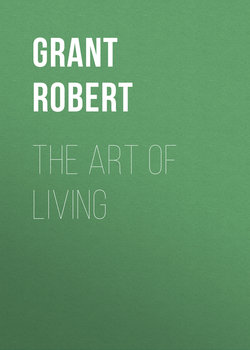The Art of Living

Реклама. ООО «ЛитРес», ИНН: 7719571260.
Оглавление
Грант Роберт. The Art of Living
Income
I
II
The Dwelling
I
II
House-Furnishing and the Commissariat
I
II
Education
I
II
Occupation
I
II
The Use of Time
I
II
The Summer Problem
I
II
The Case of Man
I
II
The Case of Woman
I
II
The Conduct of Life
I
II
Отрывок из книги
Rogers, the book-keeper for the past twenty-two years of my friend Patterson, the banker, told me the other day that he had reared a family of two boys and three girls on his annual salary of two thousand two hundred dollars; that he had put one of the boys through college, one through the School of Mines, brought up one of the girls to be a librarian, given one a coming-out party and a trousseau, and that the remaining daughter, a home body, was likely to be the domestic sunshine of his own and his wife’s old age. All this on two thousand two hundred dollars a year.
Rogers told me with perfect modesty, with just a tremor of self-satisfaction in his tone, as though, all things considered, he felt that he had managed creditably, yet not in the least suggesting that he regarded his performance as out of the common run of happy household annals. He is a neat-looking, respectable, quiet, conservative little man, rising fifty, who, while in the bank, invariably wears a nankeen jacket all the year round, a narrow black necktie in winter, and a narrow yellow and red pongee wash tie in summer, and whose watch is no less invariably right to a second. As I often drop in to see Patterson, his employer, I depend upon it to keep mine straight, and it was while I was setting my chronometer the other day that he made me the foregoing confidence.
.....
There are so many things which one has to have nowadays in order to be comfortable that it seems almost improvident to inquire how much one ought to save before facing the question of what one can possibly do without. Here the people who are said to have too much for their own good have an advantage over the rest of us. The future of their children is secure. If they dread death it is not because they fear to leave their wives and children unprovided for. Many of them go on saving, just the same, and talk poor if a railroad lowers a dividend, or there is not a ready market for their real estate at an exalted profit. Are there more irritating men or women in the world than the over-conservative persons of large means who are perpetually harping on saving, and worrying lest they may not be able to put by for a rainy day, as they call it, twenty-five per cent. or more of their annual income? The capitalist, careworn by solicitude of this sort, is the one fool in creation who is not entitled to some morsel of pity.
How much ought the rest of us to save? I know a man – now you do not know him, and there is no use in racking your brains to discover who he is, which seems to be a principal motive for reading books nowadays, as though we writers had a cabinet photograph in our mind’s eye whenever we took a pen in hand. I know a man who divides his income into parts. “All Gaul is divided into three parts,” you will remember we read in the classics. Well, my friend, whom we will call Julius Cæsar for convenience and mystification, divides his income, on the first of January, into a certain number of parts or portions. He and his wife have a very absorbing and earnest pow-wow over it annually. They take the matter very seriously, and burn the midnight oil in the sober endeavor to map and figure out in advance a wise and unselfish exhibit. So much and no more for rent, so much for servants, so much for household supplies, so much for clothes, so much for amusements, so much for charity, so much to meet unlooked-for contingencies, and so much for investment. By the time the exhibit is finished it is mathematically and ethically irreproachable, and, what is more, Julius Cæsar and his wife live up to it so faithfully that they are sure to have some eight or ten dollars to the good on the morning of December thirty-first, which they commonly expend in a pair of canvas-back ducks and a bottle of champagne, for which they pay cash, in reward for their own virtue and to enable them at the stroke of midnight to submit to their own consciences a trial balance accurate to a cent.
.....